2021-2022 Annual Report
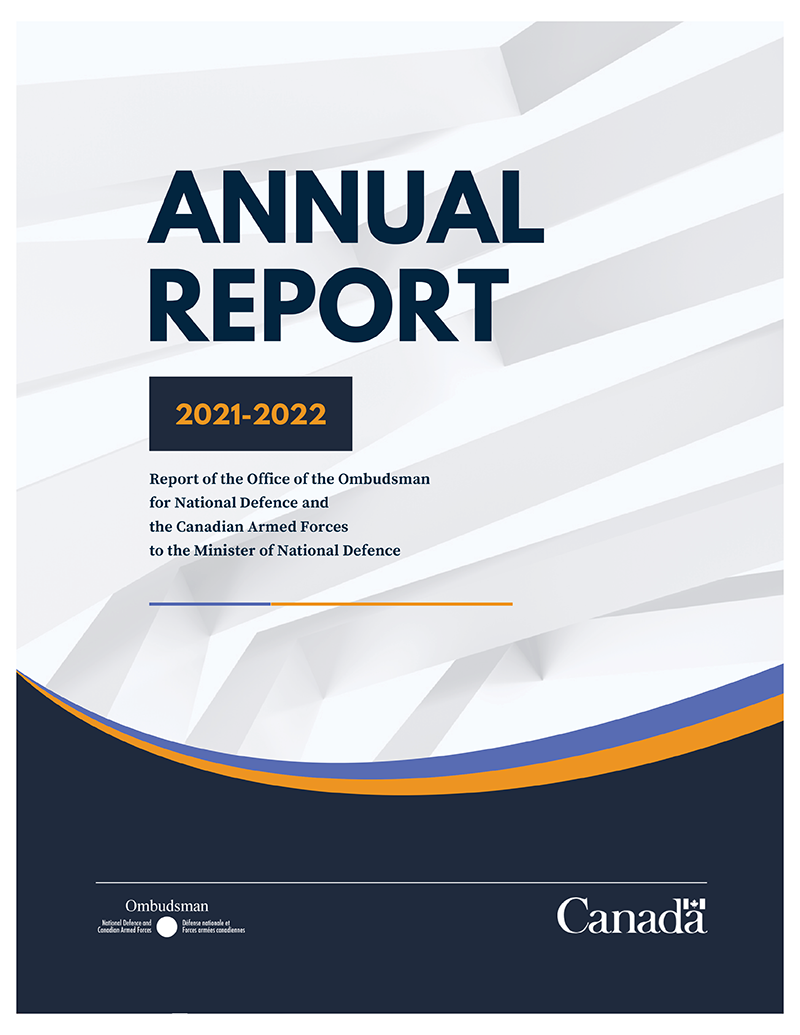
Ombudsman’s message
We continued to overcome many challenges rooted in the ongoing COVID-19 pandemic during 2021–2022. Nevertheless, we actively ensured the fair treatment of our constituents by the Department of National Defence (DND) and the Canadian Armed Forces (CAF).
This year, I reiterated concerns raised by previous Ombuds about the independence of this office. In the context of the ongoing misconduct crisis in the military, my June 2021 position paper and corresponding national press conference called for my office to report directly to Parliament. Doing so would allow us to have independent civilian oversight of the DND and the CAF. We would also be free of potential political interference and reliance on the department for financial and human resources authorities. I am pleased that the Standing Committee on National Defence recently made a similar recommendation. This recommendation was endorsed unanimously by all Committee members representing all political parties.
I remain very concerned about the state of the CAF's grievance system as well as the delays members are experiencing in receiving decisions. I reiterated to the Chief of the Defence Staff, General Wayne Eyre, that we need immediate and concrete action to address this issue which can cause members undue harm.
Mental health remains one of my top priorities. I continued to share messages of support and resources to help break the silence around mental illness across Canada. I am proud to say that we continued to foster a respectful and healthy work environment while working remotely. The office continues to support the internal mental health initiative launched in 2016-17. I strongly believe that supporting my employees’ health and wellness is critical to our success and to our continuing ability to support our constituents.
This year, we updated our Five-Year Systemic Investigation Plan that outlines thematic areas for future investigations. Although our areas of focus may change due to unforeseen and pressing matters, we will investigate the following themes during the coming years in keeping with our plan:

Five-Year Systemic Investigation Plan—Description
Areas of focus:
- 2019‒2021: Outcan postings
- 2021‒2023: Diversity and Employment Equity
- 2021‒2022: Families compassionate postings
- 2022‒2023: Mental health
- 2023‒2024: Complaint mechanisms
- 2024‒2025: Reserve force
- 2025‒2026: Transition
Notes:
From 2019 to 2026:
- All investigations will be conducted with a gender lens and a civilian lens
- All investigations will be conducted with a diversity, inclusion and employment equity lens
- Progress reports
Finally, I would like to express my heartfelt gratitude to my staff for their loyalty and hard work. The effort and dedication they continually demonstrate are the qualities that make what we do possible: contributing to substantial and long-lasting improvements for the Defence community.
My office is ready to help our constituents in the Defence community.
Gregory A. Lick
Ombudsman
Director General Operation’s message
Throughout 2021–2022, we worked diligently to advocate for fairness for our constituents. Despite pandemic restrictions, this year was successful. We continued to educate and inform constituents as well as conduct individual and systemic investigations. In addition, we recommended changes to the DND and CAF leadership so as to bring improvements to the Defence community.
This year, we saw an increase of 38 per cent in new individual cases. This is the largest number of cases since we opened our doors in 1998. These cases resulted in our constituents receiving the information they needed, referrals to the appropriate authority, and recommendations to the DND and CAF leadership where we found unfairness. We also created and published over 67 information documents on our website and social media. The DND and CAF leadership accepted all of the 40 recommendations we made on individual files this year, many of which led to positive systemic changes for our constituents.
Again this year, we conducted a virtual outreach program. We held engagement sessions as well as a series of armchair discussions with constituents and stakeholders. We listened to concerns from the Defence community, and explained how we can help. We incorporated innovative technologies to increase the accessibility of our services and to allow constituents to raise concerns anonymously. We also ensured that gender and other identity factors were considered in all of our work.
Our office completed a systemic investigation that included recommendations to improve the well-being of CAF members and their families. We also completed an historical review entitled Employment Equity and Diversity in the DND and the CAF. We describe these investigations in detail and provide insight about related long-standing challenges later in this Annual Report.
Moving forward, we will continue to conduct research and analysis in order to make evidence-based recommendations. This work will address issues affecting the Defence community that result in unfairness for our constituency. We will continue to examine and monitor areas relevant to employment equity, such as career advancement, recruitment, retention, and culture. I look forward to the launch of this year’s systemic investigation that will focus on the theme of mental health.
This office has accomplished much this past year; this annual report summarizes the impact of our efforts. Our team ensured that the DND and CAF treat our constituents with transparency, fairness, and respect. They heard and addressed our constituents' concerns, and investigated when necessary. We are proud of what has been achieved, and I look forward to another successful year ahead.
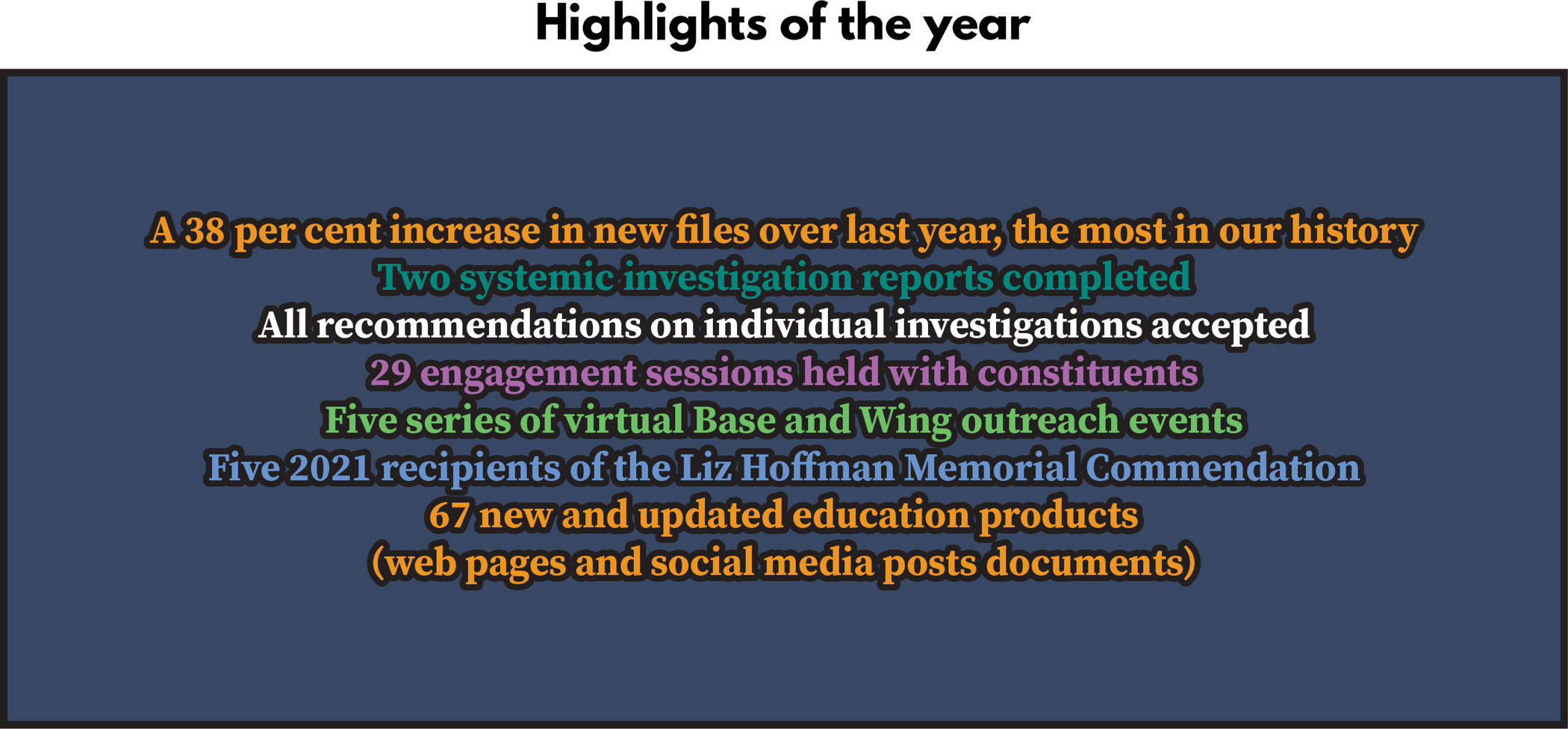
Highlights of the year—Description
- A 38 per cent increase in new files over last year, the most in our history
- Two systemic investigation reports completed
- All recommendations on individual investigations accepted
- 29 engagement sessions held with constituents
- Five series of virtual Base and Wing outreach events
- Five 2021 recipients of the Liz Hoffman Memorial Commendation
- 67 new and updated education products (web pages and Did You Know documents)
Robyn Hynes
Director General,
Operations
Recognizing the Defence community: The Liz Hoffman Memorial Commendation
The Liz Hoffman Memorial Commendation recognizes individuals and groups who have exceeded expectations in helping resolve a difficult problem or have helped bring about positive and lasting change to the DND and the CAF.
Liz Hoffman was an investigator with the Ombudsman’s Office who had a deeply-rooted sense of fairness and was a tremendous force for positive change. This commendation recognizes those in the Defence community who, like Liz, are dedicated to helping others and making a difference.
This year’s recipients were (from left to right): Lieutenant-Colonel Trisha MacLeod, Ms. Shelley Hopkins, Ms. Monica Bobbitt, Mrs. Kim Mills, and Ms. Leanne Pelley.

Making a difference in the lives of our constituents
Reinstating benefits
We intervened in the case of a reservist employed on Class B whose Public Service Health Care Plan (PSHCP) dependent benefits had ceased, despite the extension of the reservist’s period of employment.
Working with the Director General Compensation and Benefits (DGCB) staff and the unit Commanding Officer, we determined that the unit had not processed the necessary paperwork when extending the period of employment. This resulted in the PSHCP coverage interruption. We discussed the compelling circumstances of this case with DGCB, and they intervened and processed the paperwork quickly to reinstate retroactively the PSHCP coverage. This allowed the member to be reimbursed for costs already incurred. Further, the unit pledged to implement a new administrative process aimed at avoiding a repeat occurrence in the future. Thanks to our intervention, the member avoided a significant financial impact to pay for costly, lifesaving prescriptions.
Ensuring procedural fairness
We received an individual complaint about the Director Compensation Benefits Administration (DCBA) adjudication process. We determined that the process for informing members about their recourse options had changed. Our investigator recommended that DCBA staff proactively share this information in their responses to adjudications. DCBA staff accepted this recommendation, and they are implementing it to ensure members know their recourse options.
Overcoming communication barriers
We received a complaint about delays in receiving payment of an Alternate Dispute Resolution (ADR) settlement agreement. The employee was entitled to back-pay for an acting assignment, but was never compensated. After trying to resolve the issue with management and the Administrative Officer, the process reached an impasse.
Our complaint analyst spoke to the Labour Relations Manager, who assigned the file to a Labour Relations Advisor for resolution. After further delays, our complaint analyst identified and helped correct a breakdown in communication that occurred between the Labour Relations Advisor and the employee’s unit. As a result, the necessary information was sent to the Pay Centre in order for the payment to be processed.
Ensuring the fairness of a release process
A CAF member contacted our office after receiving a 30-day compulsory release (category 5D) while being subject to an Administrative Review Medical Employment Limitation (AR/MEL). As the member also reported having ongoing physical and mental health injuries, we flagged this file as compelling and time-sensitive.
We consulted the relevant DND and CAF officials such as the Director Military Careers Administration, the chain of command, and the Medical Officer to gather further information. We determined that the member would benefit from allowing the AR/MEL to conclude to ensure receipt of the appropriate release category. We raised the issue with the Commander of the Canadian Army, who agreed and granted the member a 30-day release extension. The AR/MEL concluded and the decision was to uphold the 5D release. Although this may not have been the outcome for which the member had hoped, we ensured the release was fair by way of the consideration of all of this file’s circumstances.
How we helped: a year in review
Demographic data
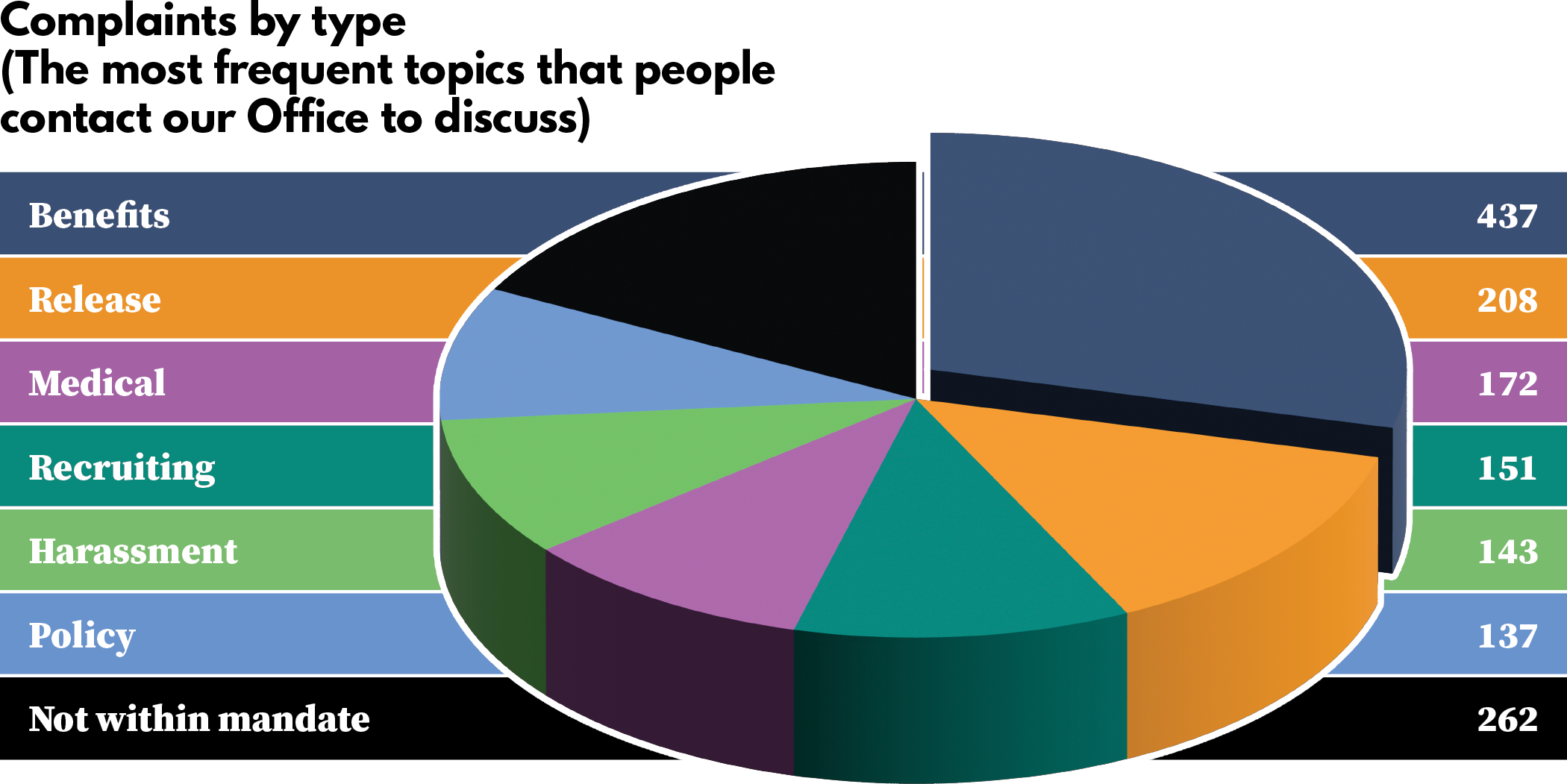
Complaints by type—Description
- Benefits: 437
- Harassment: 143
- Medical: 172
- Not within mandate: 262
- Policy: 137
- Recruiting: 151
- Release: 208

Complaints by constituent type—Description
| Constituent type | 2018-2019 | 2019-2020 | 2020-2021 | 2021-2022 |
|---|---|---|---|---|
| Regular Force | 660 | 668 | 595 | 797 |
| Reserve Force | 149 | 116 | 124 | 159 |
| Family member | 61 | 97 | 87 | 143 |
| Former military member | 369 | 292 | 284 | 410 |
| Non-constituent | 70 | 90 | 90 | 151 |
| Civilian employee | 81 | 109 | 77 | 82 |
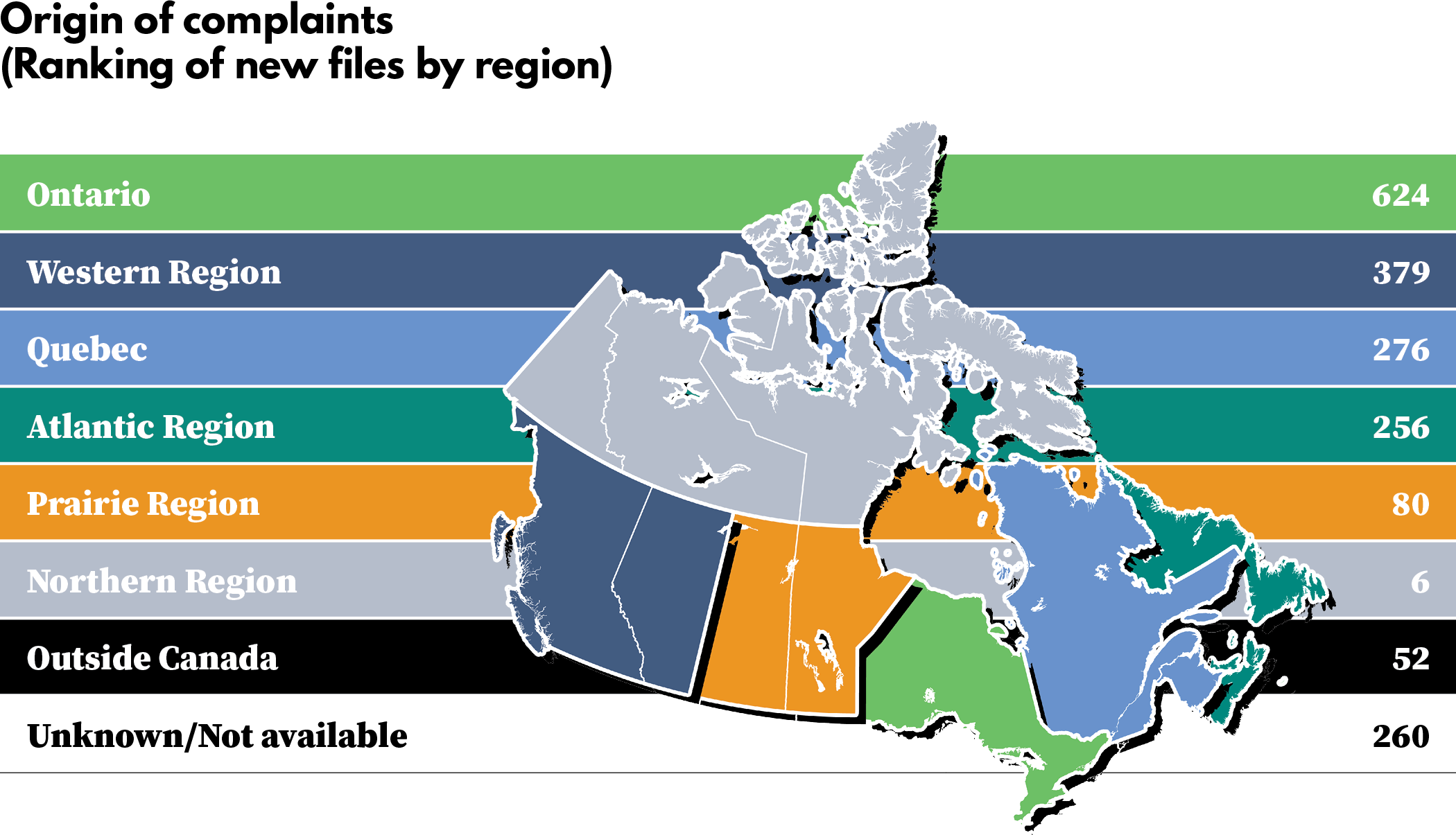
Complaints by constituent type—Description
- Atlantic: 256
- Northern: 6
- Ontario: 624
- Outside: 52
- Prairies: 80
- Quebec: 276
- Western: 379
Disposition of cases
Sample cases which describe the case types we handle are available on our website. The process which describes what happens when a constituent contacts our office can be found on our contact page.

Total cases handled—Description
- New cases: 1,931
- Cases still in process from previous fiscal year: 234
- Cases re-opened: 133
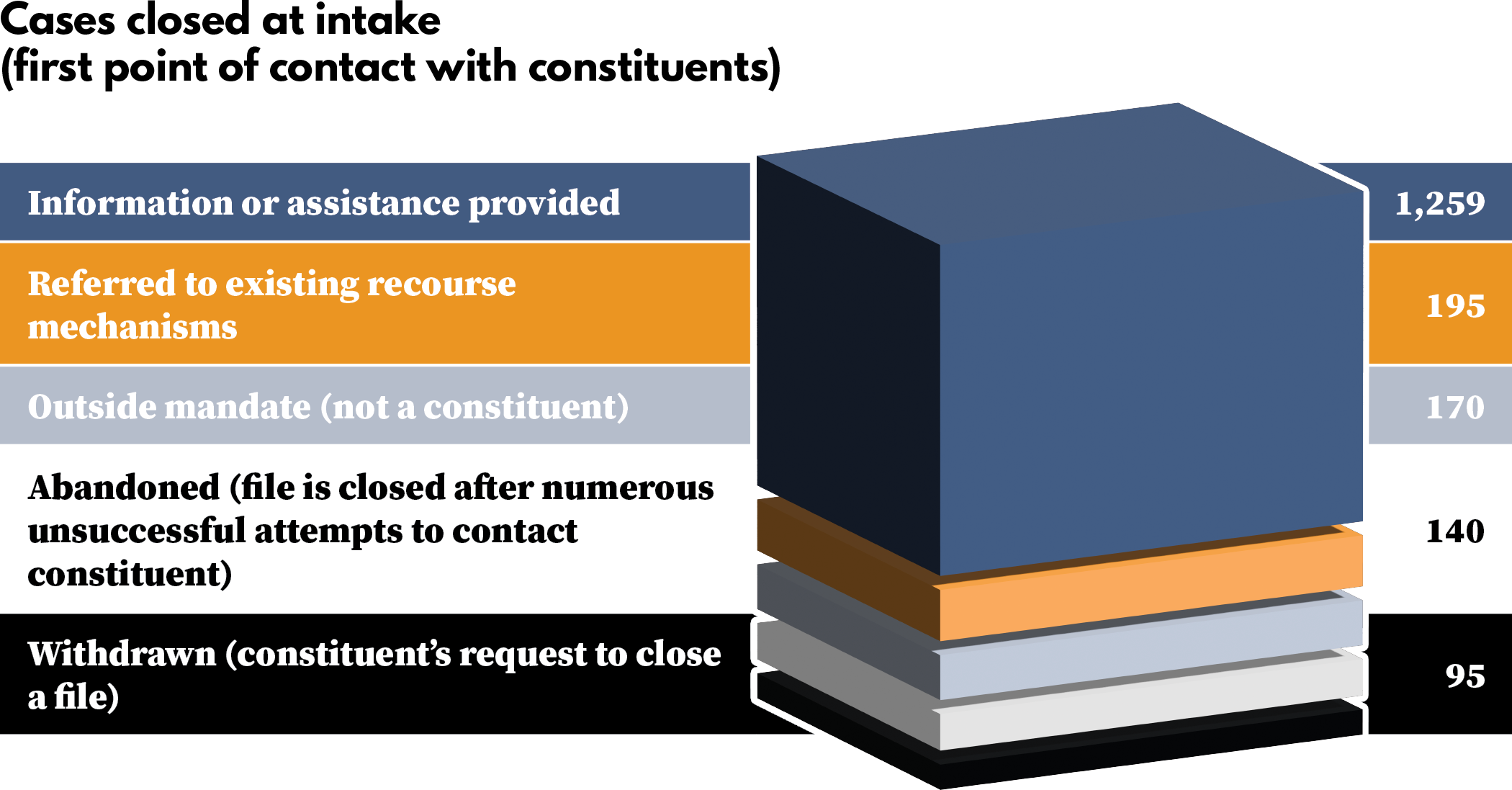
Cases closed at intake (first point of contact with constituents)—Description
- Information or assistance provided: 1,259
- Outside mandate (not a constituent): 170
- Referred to existing recourse mechanisms: 195
- Withdrawn (constituent’s request to close a file): 95
- Abandoned (file is closed after numerous unsuccessful attempts to contact constituent): 140
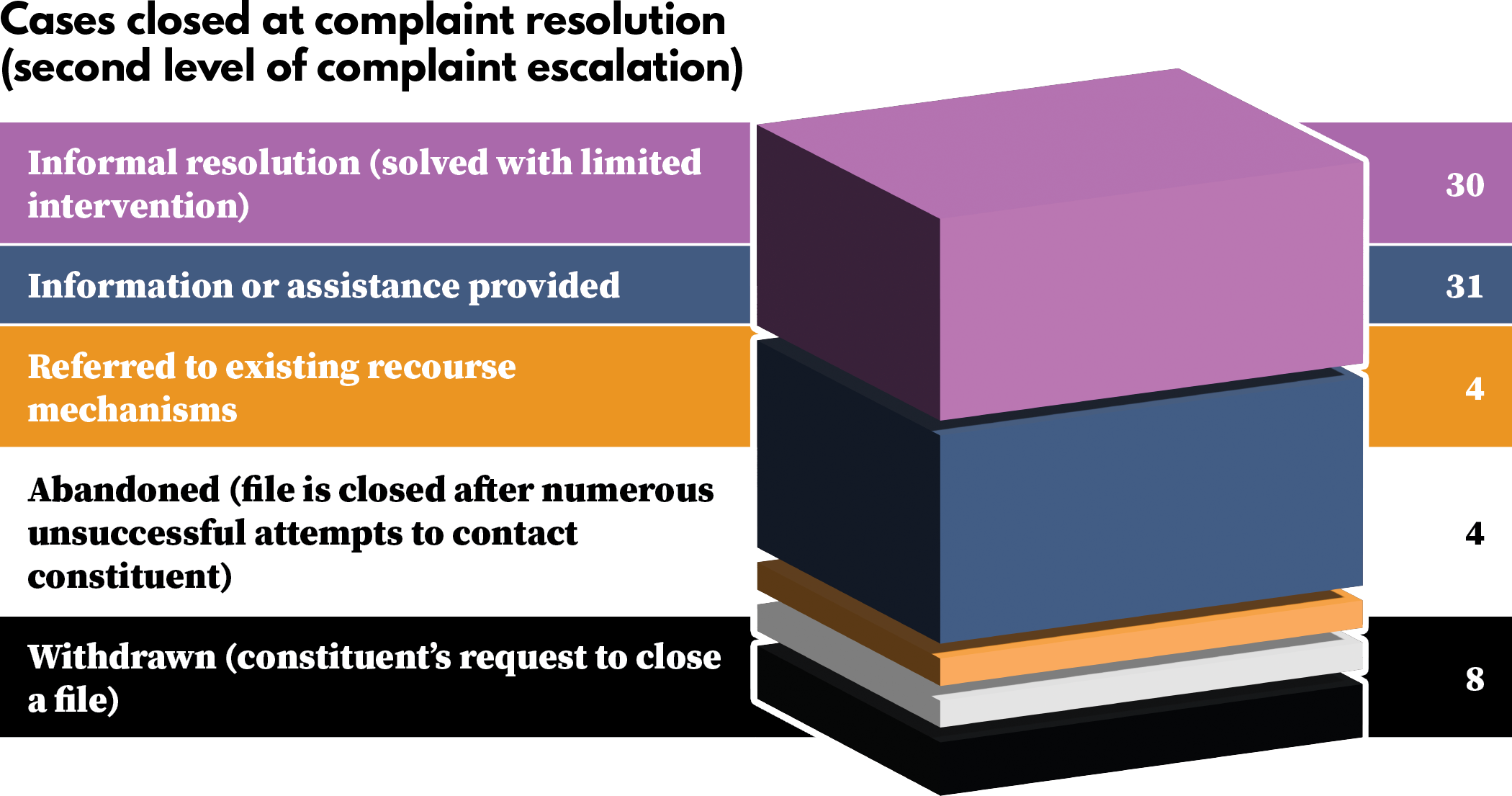
Cases closed at complaint resolution (second level of complaint escalation)—Description
- Informal resolution (solved with limited intervention): 30
- Information or assistance provided: 31
- Withdrawn (constituent’s request to close a file): 8
- Referred to existing recourse mechanisms: 4
- Abandoned (file is closed after numerous unsuccessful attempts to contact constituent): 4
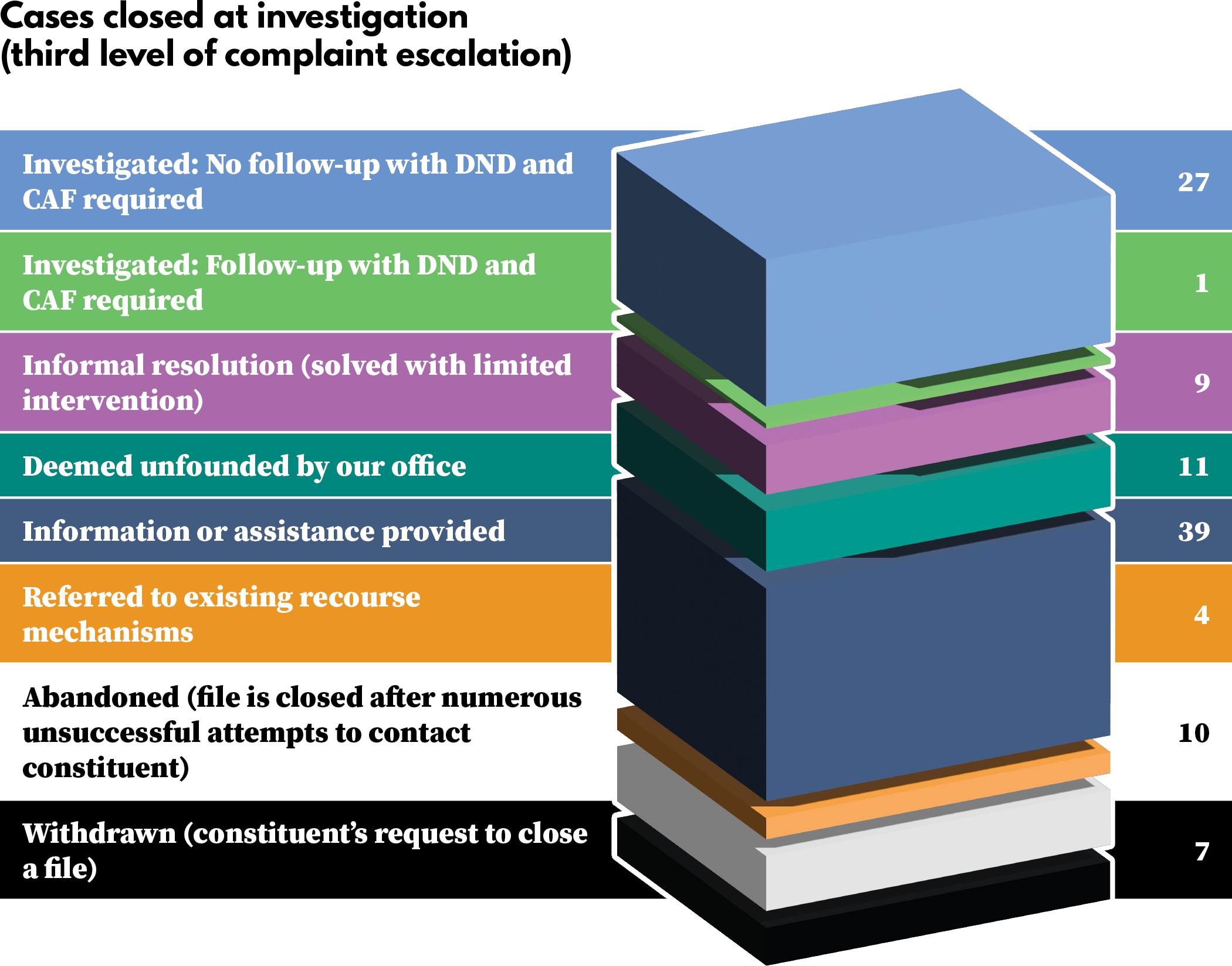
Cases closed at investigation (third level of complaint escalation)—Description
- Information or assistance provided: 39
- Deemed unfounded by our office: 11
- Informal resolution (solved with limited intervention): 9
- Referred to existing recourse mechanisms: 4
- Investigated: No follow-up with DND and CAF required: 27
- Investigated: Follow-up with DND and CAF required: 1
- Abandoned (file is closed after numerous unsuccessful attempts to contact constituent): 10
- Withdrawn (constituent’s request to close a file): 7
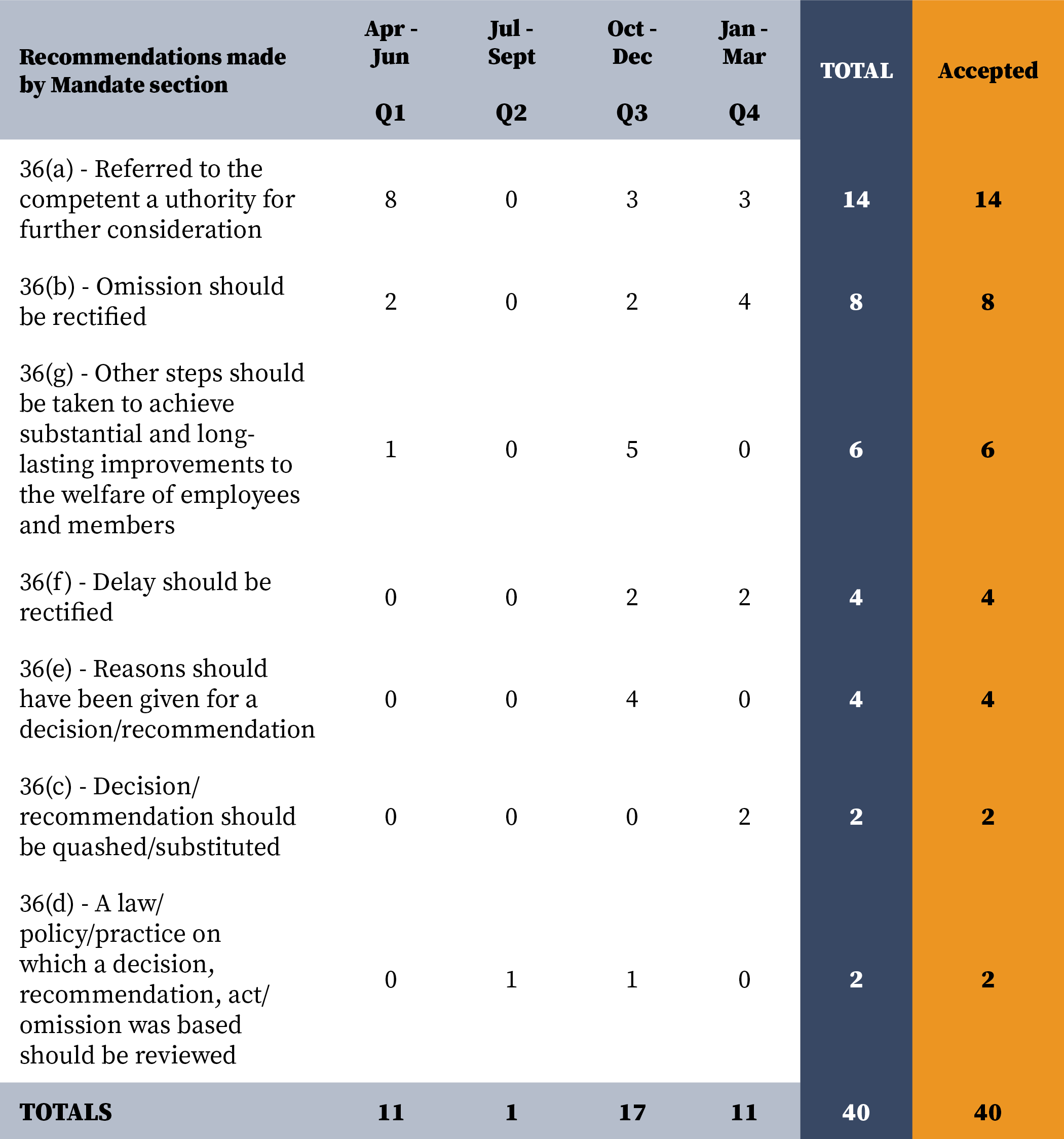
Section of the Mandate under which recommendations were made—Description
Based on the 106 investigative files closed by our General Investigations team in fiscal year 2021-22, our office made 40 recommendations to the DND/CAF. All were accepted.
| Recommendations made by Mandate section | Quarter 1 Footnote * |
Quarter 2 |
Quarter 3 |
Quarter 4 |
Total |
Accepted |
|---|---|---|---|---|---|---|
| 36(a) - Referred to the competent authority for further consideration | 8 | 0 | 3 | 3 | 14 | 14 |
| 36(b) - Omission should be rectified | 2 | 0 | 2 | 4 | 8 | 8 |
| 36(c) - Decision/recommendation should be quashed/substituted | 0 | 0 | 0 | 2 | 2 | 2 |
| 36(d) - A law/policy/practice on which a decision, recommendation, act/omission was based should be reviewed | 0 | 1 | 1 | 0 | 2 | 2 |
| 36(e) - Reasons should have been given for a decision/recommendation | 0 | 0 | 4 | 0 | 4 | 4 |
| 36(f) - Delay should be rectified | 0 | 0 | 2 | 2 | 4 | 4 |
| 36(g) - Other steps should be taken to achieve substantial and long-lasting improvements to the welfare of employees and members | 1 | 0 | 5 | 0 | 6 | 6 |
| TOTALS | 11 | 1 | 17 | 11 | 40 | 40 |
Figure 10 Notes
|
||||||
How we helped: investigating systemic issues
Systemic investigations and progress reports are available on our website.
Service versus Self: A systemic investigation into contingency cost moves for personal reasons, compassionate status, and compassionate postings in the Canadian Armed Forces
In January 2021, we launched a systemic investigation of issues affecting military families with a focus on the administration of compassionate postings—including compassionate status (with or without a compassionate posting) and contingency cost moves for personal reasons. This report was completed in March 2022.
Main areas of concern:
- policy and process
- communication
- mental health and support services.
This report contains:
- seven findings
- one observation
- three recommendations
Employment Equity and Diversity in the Department of National Defence and the Canadian Armed Forces—Historical Efforts to Address Employment Equity
In November 2020, the Minister of National Defence asked us to review employment equity within the CAF and DND to ensure they are fulfilling their current obligations as well as to provide recommendations on how they can make their institution more equitable. In December 2020, we launched our formal investigation by examining the challenges identified in all employment equity plans, employment system reviews, Canadian Human Rights Commission and Office of the Auditor General audits as well as other reports released since 1997. The first report tied to this investigation, a historical review of employment equity in the DND and the CAF from 1997 to 2021, is the first time that these plans, reviews, audits, and reports have been analyzed in one report. We completed this report in March 2022.
We identified five areas of concern:
- employment equity representation goals,
- recruitment,
- career advancement,
- retention, and
- culture.
Follow-up on recommendations
We conduct annual follow-ups to evaluate the implementation of any recommendations made in our investigative reports. In 2020-2021, this work was interrupted by the COVID-19 global pandemic. In December 2021, we resumed our follow-ups on nine investigative reports, and have engaged the DND and the CAF to assess their progress. When completed, our progress reports will be published on our website.
How we helped: connecting with constituents
Educational products
We prepare content based on our analysis of intake cases, constituent engagements, and stakeholder meetings. The following is a list of our latest educational products:
- New resources on the Compassionate Posting process
- Updated health resources
- Updated career and employment resources
- Updated and expanded information for Reservists
Engagements
We connect with our constituents through outreach activities.
In 2020-2021, our outreach involved:

Outreach—Description
- 29 outreach activities, and
- over 3,000 constituents engaged.
We meet with Parliamentarians to foster constructive working relationships as well as provide key issue updates.
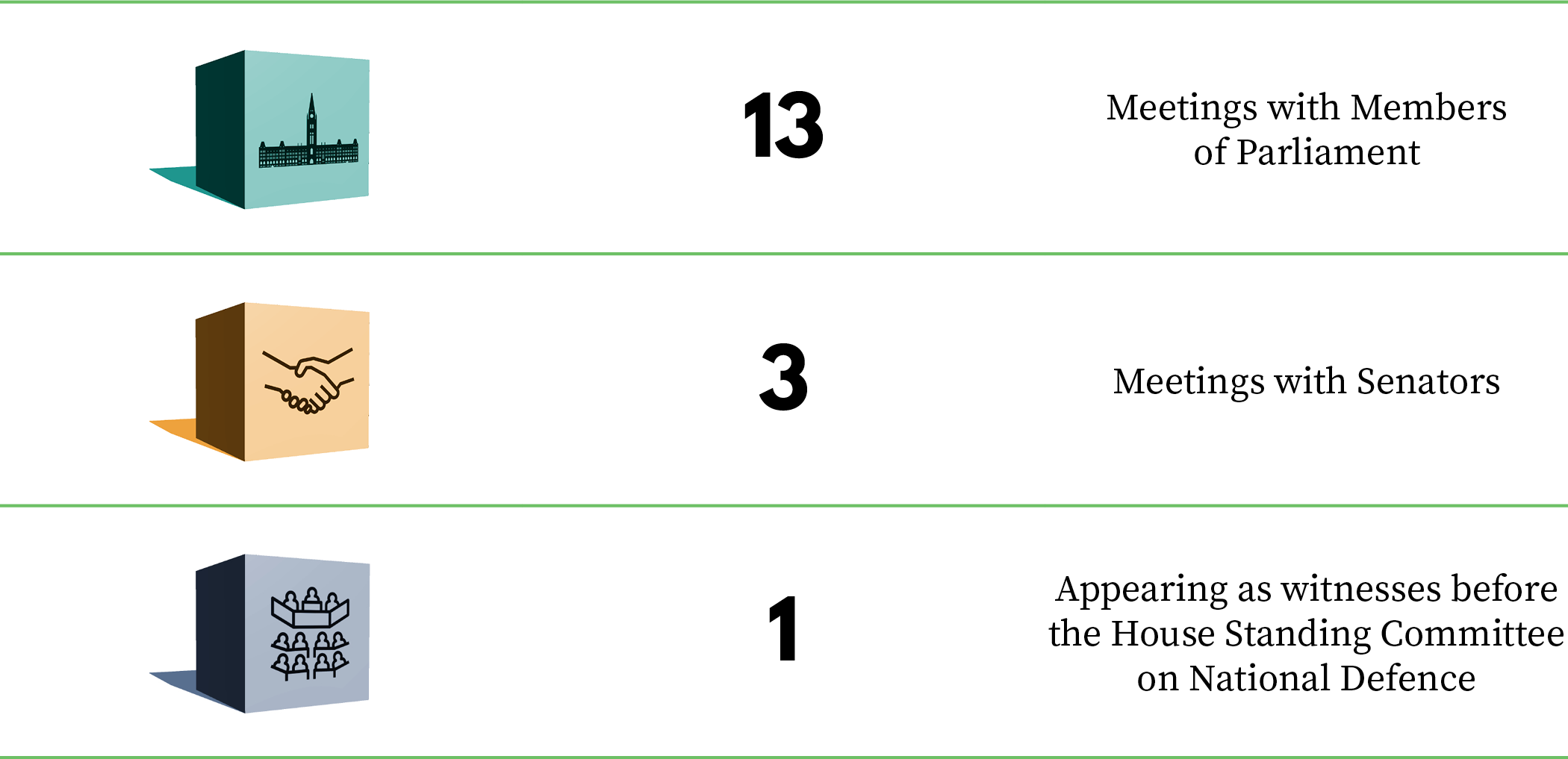
Parliamentary engagement—Description
- Meetings with Members of Parliament: 13
- Meetings with Senators: 3
- Appearing as witnesses before the House Standing Committee on National Defence: 1
We speak to media and hold press conferences to ensure widespread dissemination of our issues.
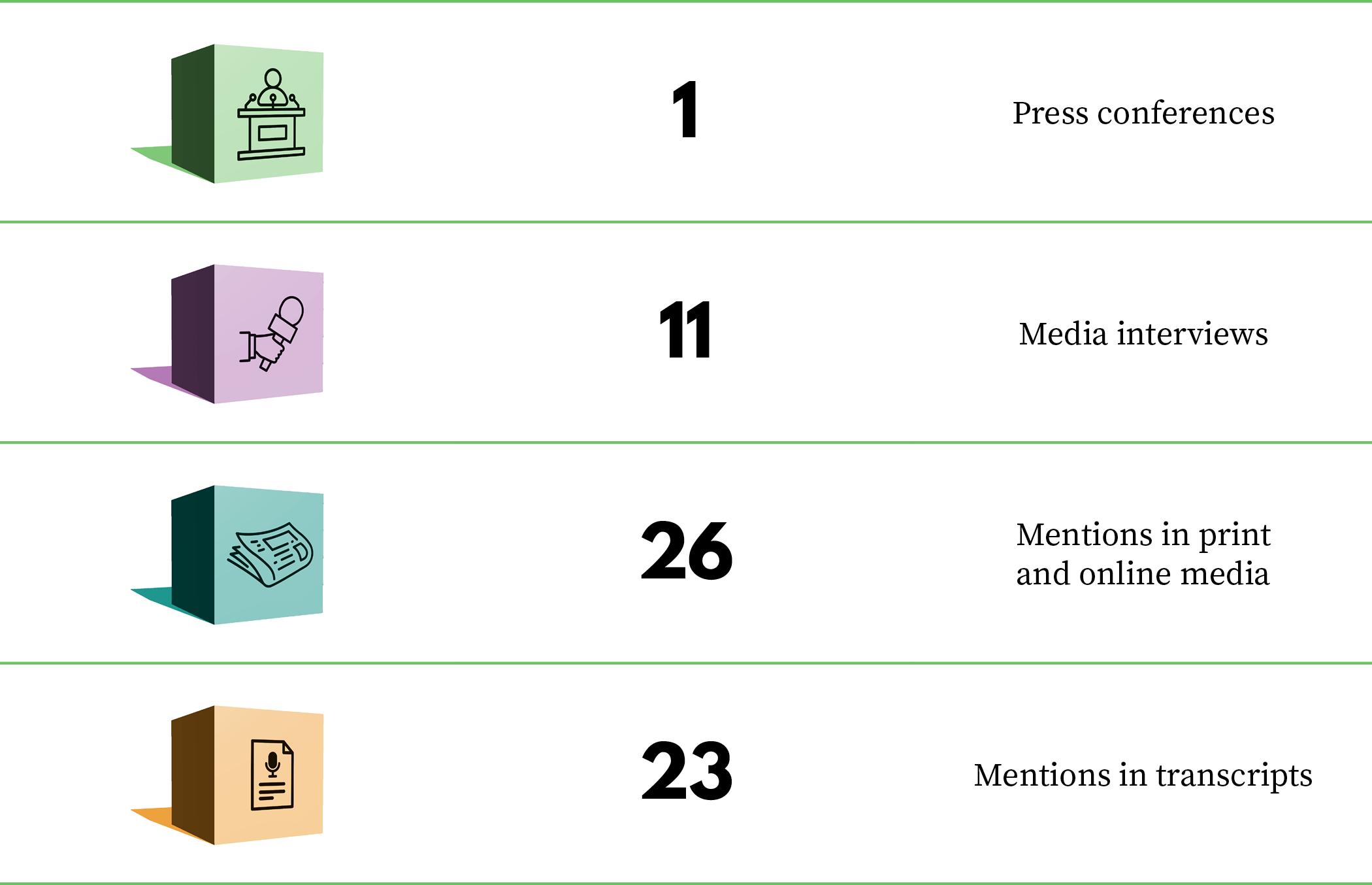
Media—Description
- Press conferences: 1
- Media interviews: 11
- Mentions in print and online media: 26
- Mentions in transcripts: 23
We participate in international meetings with other ombudsman organizations to share knowledge and advance fairness for the Defence community.

International Engagements—Description
- International engagements – 2
Digital engagement
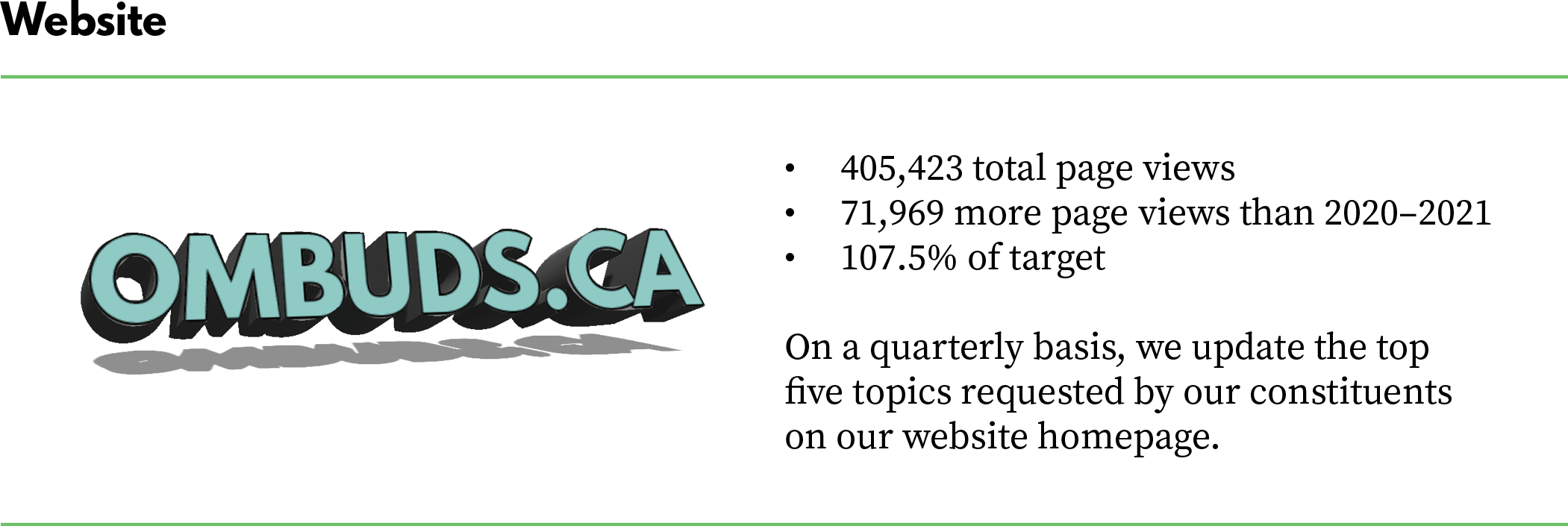
Website—Description
- 405,423 total page views
- 71,969 more page views than 2020–2021
- 5% of target
On a quarterly basis, we update the top five topics requested by our constituents on our website homepage.
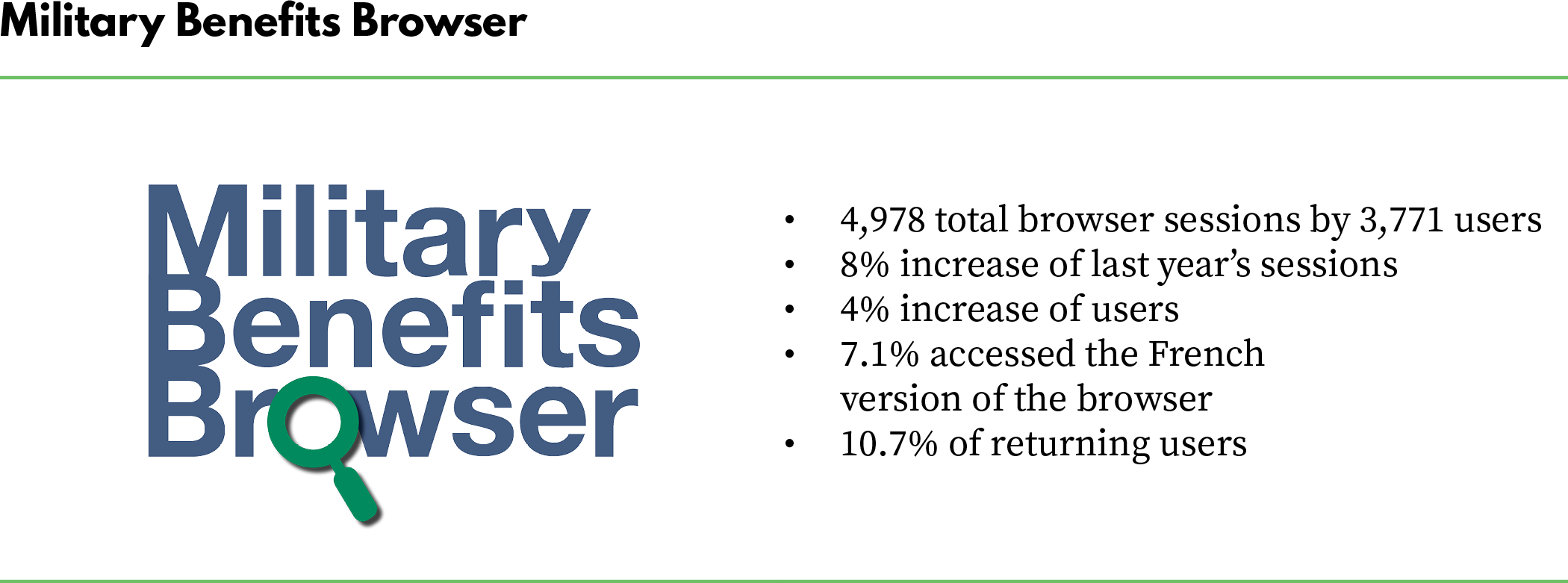
Military Benefits Browser—Description
- 4,978 total browser sessions by 3,771 users
- 8% increase of last year’s sessions
- 4% increase of users
- 1% accessed the French version of the browser
- 7% of returning users
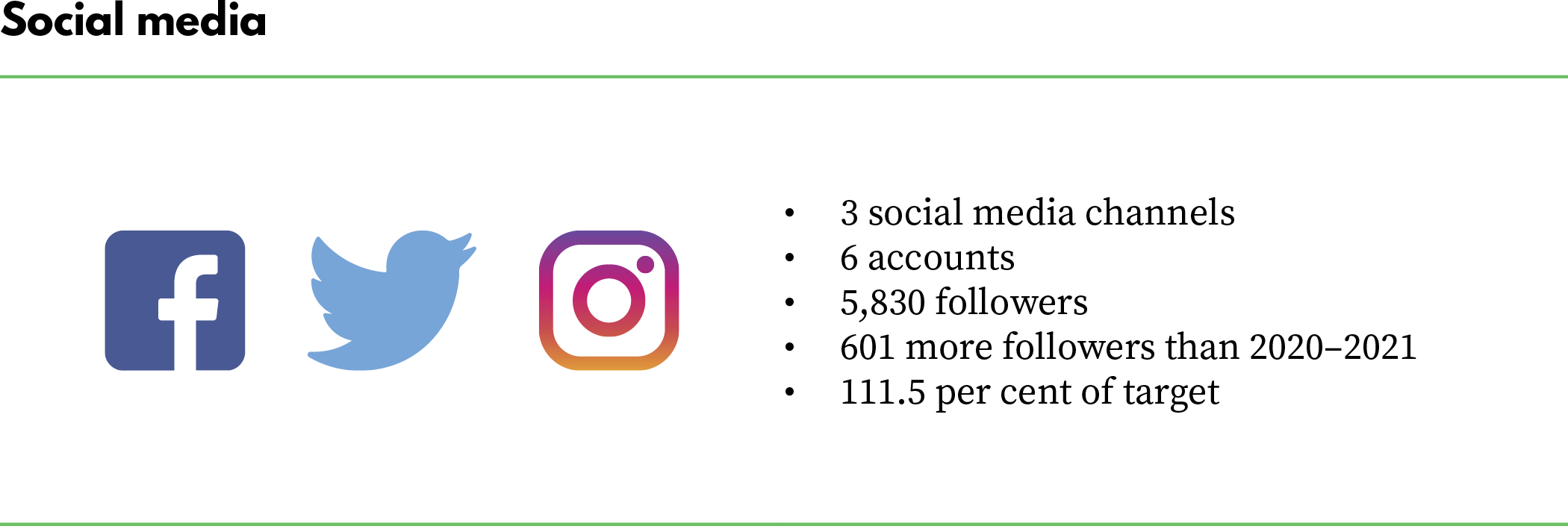
Social media—Description
- 3 social media channels
- 6 accounts
- 5,830 followers
- 601 more followers than 2020–2021
- 5 per cent of target
Ombudsman’s Advisory Committee
We engaged the Ombudsman’s Advisory Committee virtually throughout the year to leverage their expertise and solicit their views about our priorities. The Committee was engaged with the systemic investigations of contingency cost moves, compassionate status and compassionate postings in the CAF, the historical review of employment equity and diversity in the DND and the CAF, the development of educational products, nominations for the Liz Hoffman Memorial Commendation, as well as the evolution of our Five-Year Systemic Investigation Plan.
Appendix 1—Financial statement
In 2021–2022, our office was allocated a budget of $7,741,358. Actual expenditures totalled $6,892,061 of which $6,184,403 was related to salaries.
The difference between the approved budget and actual expenditures represents final spending as provided in the Public Accounts of Canada.
Money that remains unspent is returned to the Department throughout the fiscal year as part of its quarterly reporting process. In 2021–2022, we returned a total of $618,505 from the Salary Wage Envelope, $257,966 worth of non-salary related funds, and $86,826 worth of Vote 5 funds related to Asset Pooled Items and Capital Assets. In Q4.3 of 2021-2022 we requested a total of $118,000 from the Salary Wage Envelope in order to comply with the excess vacation and compensatory leave cash-out requirements.
Funds were returned due to delays in staffing vacant positions, restrictions on travel, delays in establishing contracts with Public Services Procurement Canada and delays in the receipt of goods (supply chain challenges). Many of these delays were due to the ongoing global pandemic.
($) |
|
|---|---|
Mail and courier services |
$2,279 |
Supplies/furniture |
$4,165 |
Training and professional dues |
$104,816 |
Acquisition and rental of office equipment |
$4,025 |
Network maintenance and support |
$28,465 |
Telecommunications and IT connections |
$105,791 |
Travel and transportation |
$1,708 |
Communications and public outreach |
$35,697 |
Professional and special services |
$357,534 |
Minor Capital and Asset Pooled Item |
$63,173 |
Salaries |
$6,184,403 |
Total |
$6,892,061 |
Appendix 2—Human resources

Our employees—Description
- Overall indeterminate, casual, and term employee count: 69
- Overall employee count at year-end (including students): 80
- Full-time employee count at year-end: 67.78
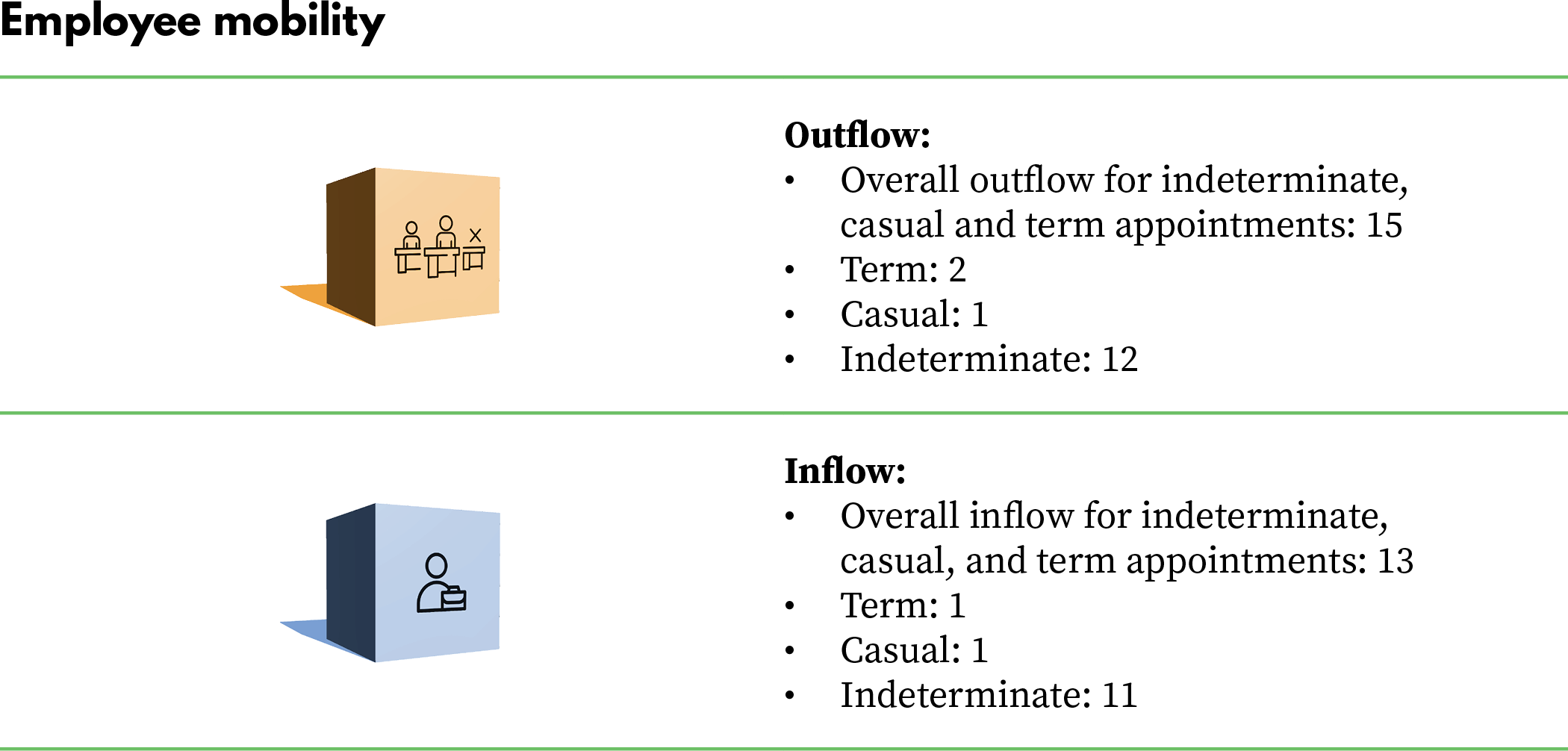
Employee mobility—Description
Outflow:
- Overall outflow for indeterminate, casual and term appointments: 15
- Term: 2
- Casual: 1
- Indeterminate: 12
Inflow:
- Overall inflow for indeterminate, casual, and term appointments: 13
- Term: 1
- Casual: 1
- Indeterminate: 11

Student employment—Description
Overall student employees: 12*
- Inflow: 10
- Outflow: 1
*One student has been with us since the previous fiscal year. Therefore, that student is not reflected in the inflow or outflow.